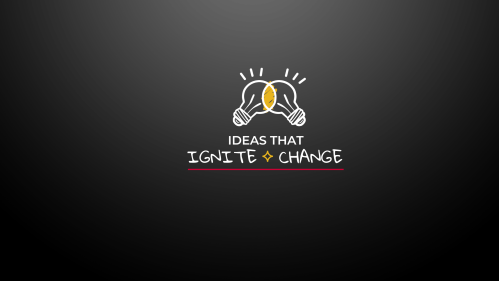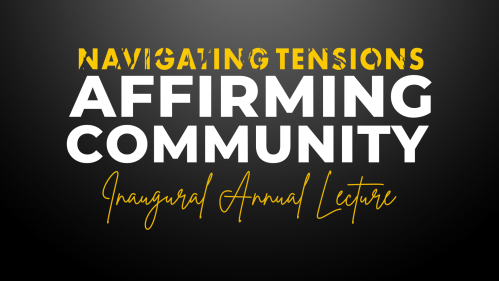
Cultivate Resilience
Small Actions, Big Impact
Tensions are rising from every angle, local, national, and global.
How we as a community respond will make all the difference.
There are many ways to meet this moment, but not all are productive.
We can turn on each other. Or, we can embrace our shared humanity, with its messiness and contradictions.
The latter requires hard and sometimes uncomfortable work to live up to aspirational values like diversity, equity, and inclusion, which are much easier to say in the abstract than amid conflict.
Small, but Significant Ideas
The Ideas that Ignite Change is a weekly Wednesday email blast that shares practices to enable us to build and sustain our community instead of coexisting in hostile proximity.
Each blast starts with a message to spur reflection from Anna Branch, Senior Vice President for Equity, and includes resources from short articles to books and videos to put the idea into practice.
The alternative is to shut down and retreat to our ideological corners. Resist that urge and stay engaged.
Start small, read and reflect on the ideas. When the opportunity presents itself, and it will, try one out.

Grappling with Beloved Community
A beloved community is a big, lofty idea. It is ambitious and embattled. It is necessary and fraught. Consider for a moment, which community you would rather be in. One with aspirations to be better - a commitment, as we have defined beloved community here at Rutgers, “to work together to embody, reflect, and respect the complexities of all our parts.” Or one without aspirations, where the ideal of a community is not asserted at all. Where there is no recognition of the interdependence of community members, we share physical space, and day-to-day circumstances dictate whether it is hostile or neutral.
Respect & Dignity
Most use respect and dignity interchangeably, but the distinction is critically important. Dignity is inherent; we possess it simply by being human. Violations of our dignity cause us harm. Respect, Hicks argues, and the parties in her dialogues agree, has to be earned. Although it is nowhere near as catchy as the famous line in the Aretha Franklin song, “All I’m askin’ is for a little respect,” we’re asking for human dignity. Imagine the respect and goodwill we could build if we can figure out how to treat others more consistently with dignity. Not sure where to start? Check out the resources below and commit to putting the ideas into practice.
Calm & Center
The purpose of being calm is not to minimize or ignore the pain or anguish, but to recognize that acting and speaking from a place where you feel out of control can take a situation from bad to worse. Imagine what could happen if we were able to resist the urge to run away from a difficult moment, and instead calm ourselves enough to enter a conversation with curiosity and compassion for ourselves and others? Don’t discount the transformative difference that pausing to take a deep breath can make in the moment. Breathing gives you the space to pause to choose to engage in a way that can maintain a relationship rather than destroy it.
Elephant & the Rider
It’s easy to question how people who “seem so reasonable” can be “so unreasonable” about certain issues. We are missing the fact that persuasion with facts has its limitations. You can’t ignore the elephant. What Dr. Haidt calls “the other 99% of the mind” that is not rational and “runs most of our behavior.” The next time you find yourself in a tricky conversation, pause long enough to truly see the person in front of you. Try to identify with them, not as a person on a different side of an issue, but as a person -- a human being just like you, deserving of dignity with hopes, wishes, and aspirations. Then, try listening again to what they are trying to say. You just might learn something, you may not agree, but you will have offered respect, and that is a great place to start.
Listening
A time will come, in a conversation or meeting where you will have to make a choice about how to engage with people you deeply disagree with. When, not if that happens, I am asking you to choose the difficult task of holding onto the idea of community. What I am asking practically is that instead of launching into a debate and taking the opportunity to “air all your grievances about the other side out.” What if you chose to take a deep breath and listen? No one wants to be shut down or vilified. It’s possible that this simple act of listening, a way of demonstrating respect, can open the door to a conversation.If engaging, terrifies you that’s okay; offering silence without judgment is listening too. The path forward is unclear, but the means to create one will require all of us and listening is where we must start.
Turn to Wonder
Amidst this unsettling reality many, craving stability, are turning inward. I get it. But there will be moments that require you to engage. Settings, like holiday gatherings, where a door opens to a conversation that cannot be closed. At that moment, before everything you have been holding inwardly explodes, I want to encourage you to turn to wonder.

Staying Resilient: Drawing a Larger Circle
Conflicts Test Our Commitment
In moments of heightened conflict, we individually and collectively demonstrate our commitment to being an inclusive community. To hold space for those with whom we disagree.
A beloved community as Dr. Martin Luther King, Jr. defined it, is purposefully a big tent. A radical idea that our interdependence is inherent.
Grapple with the idea of a beloved community. Ask yourself, How might I show up differently in conflict, if I kept the idea of a beloved community in mind?
Reject Polarization
Meet this moment with humanity.